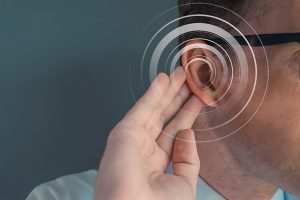People on cisplatin-based chemotherapy often suffer an unexpected side effect that can significantly compromise their quality of life, but new data could help improve their recovery, according to a study by USF Health researchers.
During treatment with this highly ototoxic drug, many patients experience hearing loss or tinnitus, but more specific input has been needed to address their needs, the Tampa-based team notes in the Journal of Clinical Oncology.
“The average person should care about this because lots of people who have cancer are on cisplatin,’’ said Victoria Sanchez, Au.D., Ph.D., the study’s lead author and assistant professor and chief of the Audiology Section in the Department of Otolaryngology at the USF Health Morsani College of Medicine. “Millions of people who are getting this medication can be affected with hearing loss.’’

Victoria Sanchez, Au.D., Ph.D.
Although previous studies have been published on the ototoxicity of cisplatin, patient-reported functional impairment had not been comprehensively evaluated. In the new study, USF Health researchers based their findings on feedback from patients who are or were on cisplatin.
This information could help doctors better predict side effects and improve treatment, said co-author Robert Frisina, Ph.D., a Distinguished University Professor and director of the USF Global Center for Hearing and Speech Research.
“Cisplatin also is used in childhood cancers, so you can imagine the impact this can have on their lives,’’ Dr. Frisina said. “Families would be interested in this research because these young adults and children would have to live with hearing loss and tinnitus for many years or for the rest of their lives … But we can’t treat this unless we understand all the mechanisms. Our hope is to one day prevent it altogether.’’
Specifically, testicular cancer survivors who were given cisplatin completed validated responses, including the Hearing Handicap Inventory for Adults and Tinnitus Primary Function Questionnaire. Associations between hearing loss or tinnitus and five pre-specified adverse health outcomes – cognitive dysfunction, fatigue, depression, anxiety, and overall health – were then evaluated.
The researchers concluded that one in three patients described “clinically significant functional impairment,’’ and that follow-up should include routine assessment and possible treatments for hearing loss and tinnitus by an audiologist.
“This is one of first reports where we included patient response,’’ Dr. Sanchez said, adding that hearing

Robert Frisina, Ph.D
health also is directly related to brain health.
However, many patients who suffer cisplatin-related hearing loss seldom change their behavior, even though hearing loss is the single largest modifiable risk factor for cognitive decline and dementia in the general population, the researchers said.
“Less than 10 percent of the people affected reported using hearing aids,’’ Dr. Sanchez said. “There are a lot of barriers to this, such as access and cost. And there’s the stigma some people have about wearing a hearing aid.’’
Cisplatin is used to manage and treat solid tumors and hematologic malignancies. While highly toxic, it is one of the most common chemotherapeutic agents used to treat cancer, either as a single-agent or combination therapy. Because of its success rate, it’s the preferred drug for testicular cancers, in addition to cancers of the bladder and ovaries.
But a drawback of such platinum-based drugs is the damage they can do to hearing. Cisplatin can leave between 40 to 80 percent of adults – and at least 50 percent of children – with “significant permanent hearing loss,’’ according to the National Institutes of Health.
Researchers aren’t certain on precisely why cisplatin invades the inner ear, while other organs in the body eliminate it within days or weeks. They do know that once in the ear, it usually does irreversible damage.
“Cisplatin is given to eliminate the cancer tumor, but for reasons not completely understood it goes into the inner ear and kills cells in the cochlea an d does it through several mechanisms, such as inflammation, programmed cell death, or overproduction of reactive oxygen species (ROS),’’ Dr. Frisina said.
d does it through several mechanisms, such as inflammation, programmed cell death, or overproduction of reactive oxygen species (ROS),’’ Dr. Frisina said.
“It can kill hearing cells and they don’t grow back … So, one implication of our paper is people who have cancer-related hearing loss and tinnitus should seek treatment.’’
— By Kurt Loft for USF Health News
